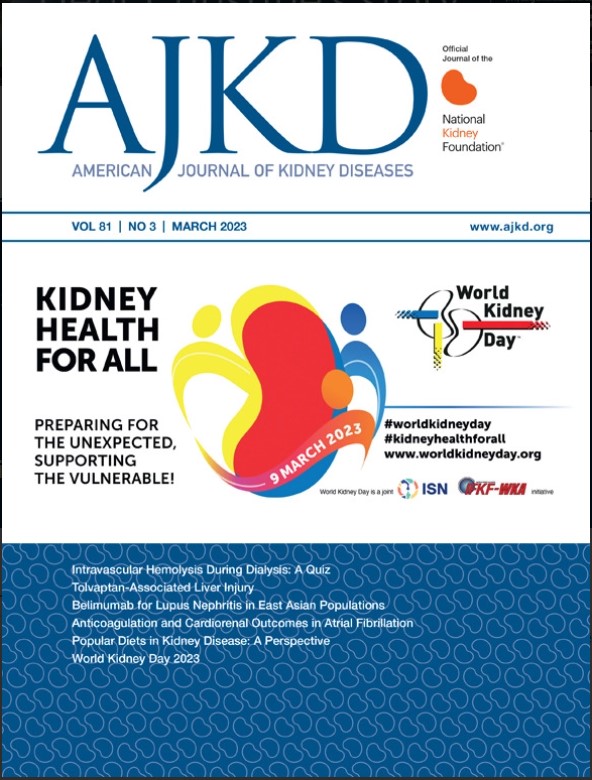Gout Management in Patients With CKD: A Review
IF 8.2
1区 医学
Q1 UROLOGY & NEPHROLOGY
引用次数: 0
Abstract
The management of gout in patients with chronic kidney disease (CKD) can be challenging due to multiple factors. These include limitations on the type or doses of medications used. Although limitations or exclusions of some treatment options are warranted, others that are traditionally followed, such as the doses used for urate-lowering therapies such as allopurinol or febuxostat, may lead to undertreatment of gout. In this review, guidelines from consensus groups are discussed with a focus on management of gout in patients with CKD and appropriate dose adjustments beyond traditional kidney-dosed limits. Studies in the literature with regard to risk factors for allopurinol hypersensitivity syndrome are reviewed, including HLAB∗5801 allele testing. Additionally, current evidence that allows providers to optimize both the effectiveness and safety of gout management in the setting of CKD, such as the “start-low-go-low” approach, are reviewed as well as considerations for kidney transplant recipients. Although there is a potential role of sodium/glucose cotransporter 2 inhibitors in lowering serum urate, it is limited in CKD. Finally, the use of immunomodulators to improve outcomes for pegloticase, a pegylated form of uricase, shows promise for increasing the utility of pegloticase in cases where it is warranted.
CKD患者痛风的管理。
由于多种因素,慢性肾脏疾病患者痛风的管理可能具有挑战性。这包括对所使用药物的类型或剂量的限制。虽然限制或排除一些治疗方案是有必要的,但其他传统上遵循的治疗方案,例如用于别嘌呤醇或非布司他等降尿酸疗法的剂量,可能导致痛风治疗不足。在这篇综述中,讨论了共识小组的指南,重点讨论了慢性肾脏疾病患者痛风的管理和超出传统肾脏剂量限制的适当剂量调整。对别嘌呤醇超敏综合征危险因素的文献研究进行综述,包括HLAB*5801等位基因检测。此外,目前的证据,允许提供者优化痛风管理的有效性和安全性,在慢性肾脏疾病的设置,如“开始低到低”的方法进行了审查,以及考虑到肾移植受者。虽然钠/葡萄糖共转运蛋白2抑制剂在降低血清尿酸盐方面有潜在作用,但在慢性肾脏疾病中作用有限。最后,使用免疫调节剂来改善pegloticase(一种聚乙二醇形式的尿酸酶)的疗效,显示出在有必要的情况下增加pegloticase效用的希望。
本文章由计算机程序翻译,如有差异,请以英文原文为准。
求助全文
约1分钟内获得全文
求助全文
来源期刊

American Journal of Kidney Diseases
医学-泌尿学与肾脏学
CiteScore
20.40
自引率
2.30%
发文量
732
审稿时长
3-8 weeks
期刊介绍:
The American Journal of Kidney Diseases (AJKD), the National Kidney Foundation's official journal, is globally recognized for its leadership in clinical nephrology content. Monthly, AJKD publishes original investigations on kidney diseases, hypertension, dialysis therapies, and kidney transplantation. Rigorous peer-review, statistical scrutiny, and a structured format characterize the publication process. Each issue includes case reports unveiling new diseases and potential therapeutic strategies.
 求助内容:
求助内容: 应助结果提醒方式:
应助结果提醒方式:


